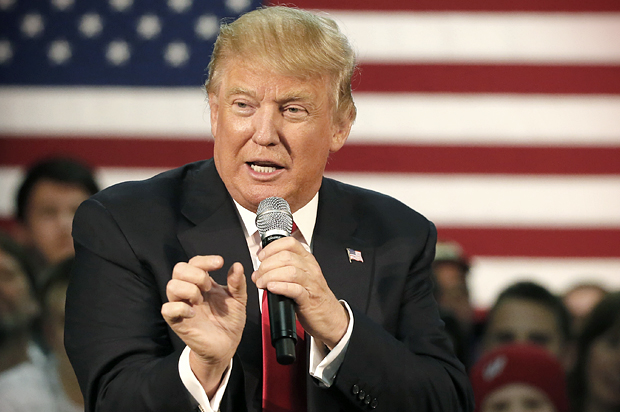 Donald Trump is a domestic terrorist. That assertion rests on two pillars: a definition and a pattern of facts.
Donald Trump is a domestic terrorist. That assertion rests on two pillars: a definition and a pattern of facts.
In the definitions of terrorism, the common elements are the use of violence or the threat of violence to coerce or intimidate other people for political purposes.
It is widely recognized that Trump’s repeated incitements during campaign speeches are out of bounds.
He laments that his followers cannot follow the practice of older days when protesters were carried out of political meetings on stretchers. He expresses regret that he cannot punch protesters in the face. While he may not have engaged in violence himself, his inflammatory comments are virtual invitations for others to do so on his behalf — witness his campaign manager’s arrest for assault.
Time to invoke the law?
Trump, of course, denies that he wishes to incite violence, exploiting the broad latitude for free speech under the first amendment. Yet, the context for assessing incitement has changed profoundly in recent years. There are ample grounds for seeking a fresh judicial review of what constitutes incitement in today’s circumstances.
The core principles on which the Supreme Court has relied stem from a distinction first made by then-Federal District Court Judge Learned Hand in 1917, namely that, to be prosecutable, language must be a “trigger to action” rather than “a key to persuasion”.
When Justice Oliver Wendell Holmes declared in 1919 that no one had the right to shout fire in a crowded theater, he added that the question was one of “proximity and degree”, that is, there must be a “clear and present danger” to public order.
In 1969, this precedent was tightened as the Supreme Court linked judgment about whether inflammatory statements tend to incite unlawful action to a verdict that such action is likely and imminent.
The court revised its earlier interpretations, now declaring that
…the constitutional guarantees of free speech and free press do not permit a State to forbid or proscribe advocacy of the use of force or of law violation except where such advocacy is directed to inciting or producing imminent lawless action and is likely to incite or produce such action.
An admirable standard, but one open to reasonable refinement.
A 21st century interpretation?
In Justice Holmes’s time, a theater generally stood as four walls with modest audiences of scores or hundreds. Today, the theater is global, an arena with no walls and audiences reaching into the millions.
Thus, proximity to provocation is measured not by great distances, but by the few feet or inches from chair to the video screen.
With such vast audiences exposed to incitement, the factors of “likelihood” and “imminence” acquire wholly different aspects.
A candidate’s invocation of violent imagery may have consequences in settings far removed from the place where the words were uttered.
The 24-hour news cycle gives unprecedented continuity and scale to campaigns. Many crowds merge into one with individuals becoming part of a singular mass, a mass that may too easily become a mob.
The dynamic has also changed markedly with the advent of social media, as the Arab Spring and the internet-savvy ISIS recruiters should have taught us.
Trump’s encouragement
Trump’s active, aggressive tweets – and the applause they receive online from his supporters – are not calculated to dampen the animus toward his opponents.
If these new realities alter the perspective on what constitutes incitement, Mr. Trump has fortified the case by promising publicly and in advance to pay the legal fees for a supporter who carries out the violence blessed by the candidate.
Even though he reneged on the pledge after instructing his staff to look into paying such fees for his North Carolina supporter who sucker-punched a young protester and suggested that next time he might have to be killed, those inquiries confirmed that, though not specifically instructed, the supporter acted in accord with Trump’s wishes.
It makes no difference that Trump now professes to disapprove the violence he previously applauded.
On to the convention?
Trump’s reckless, threatening rhetoric reached its peak in his intimation that – whether or not he enters the Republican convention with a majority of delegates – the nomination should be his or else there will be riots.
For a person in his position, to forecast a riot is to foment a riot..It is tantamount to telling delegates for other candidates “make me the nominee or my guys will break your heads!”
Incredibly, Trump’s longtime crony, Roger Stone, extended the intimidation, stating that the campaign will release delegates’ hotel room numbers during the convention if they consider switching to other candidates.
What purpose can that message have other than to caution wavering supporters that exercising the right to shift their votes will attract hostile action from the Trump camp?
Future rulings?
At least one appellate court has ruled that a so-called “true threat” test should determine whether speech is unlawful, even if it does not promote violence that is imminent and likely.
Would the courts endorse as politically protected speech a politician’s threat that, if he is not nominated, his supporters would riot? That question is worth framing for judicial action.
Delegates for other presidential contenders are the evident targets for Trump’s intimidation. They should have standing to raise the matter in court— and ought to do so before the Republican convention makes the threat imminent.
The case would undoubtedly be a difficult one, but allowing Trump’s terrorism to hover over the process is poisonous to America’s political health. No one should be allowed to threaten his way to power.

